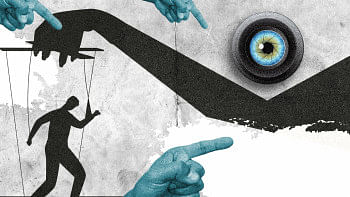Don’t criminalise free thought

We are alarmed by the extent to which intolerance has been institutionalised in the country, severely curtailing people's right to free speech. The latest victim to have paid a price for expressing an opinion – a satire, for that matter – is Salina Akhter Shelley, poet and acting principal of Chattogram Port Authority Women's College. The Chittagong Port Authority (CPA) suspended Selina on April 16, alleging that her Facebook status on the Arabic word Ramadan had "hurt" religious sentiments, and that such an act was punishable under the Digital Security Act (DSA). Five years since the infamous DSA was passed, we are still at a loss to understand what exactly constitutes "hurting" of religious sentiments, who is entitled to have hurt sentiments, and how one can objectively judge such a feeling.
By now, we have shouted ourselves hoarse over the various ways in which the vague provisions in the DSA have been misused to target human rights defenders, opposition activists, journalists, writers, cartoonists, etc. The list of who can be a target of the DSA – and the scope of what constitutes an offence – keeps on increasing by the day, so much so that any slightly critical or creative thought can be (mis)interpreted as offensive. Its broad and ambiguous provisions have created a culture of fear, forcing people to self-censor their opinions. For how long will this draconian law – which has no place in a country that professes to be democratic – dictate our thoughts?
After defending the law for the first three years of its enactment, the law minister in December 2021 admitted that it had been "abused in certain cases", adding that a six-member team had been formed to address some of the concerns raised nationally and internationally. In February 2022, he claimed that the UN had given some suggestions to the committee, which they were looking into. But then, the relevant UN offices told The Daily Star that no such committee had been in touch with them in the two years since the minister announced its formation. Does it mean that all the talk of addressing concerns about DSA was just a charade?
On March 31, United Nations High Commissioner for Human Rights Volker Türk called for an immediate suspension of the DSA until necessary amendments were made, including repealing two sections and amending eight others. We are alarmed that far from delivering on his lofty promises of reform, the law minister rejected the possibility of repealing the two sections flagged by the OHCHR, and stated in no uncertain terms that the DSA was here to stay.
The government's reluctance to amend or repeal the DSA is an ominous sign, particularly as the national elections approach. What's equally concerning is that thought policing, popularised by the DSA, now seems to have spread across the country, with different institutions taking it upon themselves to criminalise diversity of thought, as evidenced by the case against Salina. We urge the authorities to withdraw the suspension against her, and stop criminalisation of freethinking by any means.


 For all latest news, follow The Daily Star's Google News channel.
For all latest news, follow The Daily Star's Google News channel. 










Comments